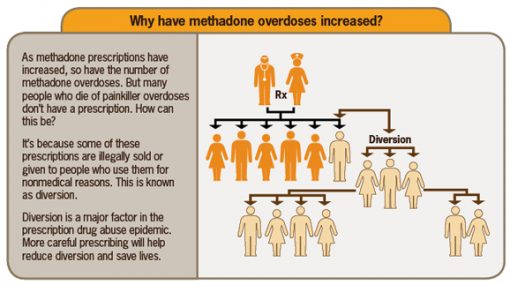5 Ways to Avoid Overdosing in a Methadone Treatment Program
If you’ve decided to overcome opiate addiction through a methadone treatment program, you might have concerns about the possibility of overdosing on methadone. First, understand that all methadone doses are closely monitored by healthcare staff. Second, know that the benefit to joining a methadone treatment program is having around-the-clock access to medical support in the event you experience any negative side effects from the medication.
Seeking treatment to overcome opiate addiction is the greatest first step you can take toward changing your life for the better. If you or someone close to you is struggling with opiate addiction, call our helpline at 800-994-1867Who Answers? to speak to an addiction counselor who can offer you the resources and guidance you need to become healthier.
Here are 5 ways to lower your risk for overdosing on methadone during treatment.
1. Be Patient With Dose Increases
When you first begin methadone treatment, your doctor will prescribe a relatively small dose.
The purpose of starting small with doses is to allow your body to adjust to the effects of methadone. Methadone is a slow-acting drug, and takes a few days to affect your body. Taking doses that are too high in the beginning could “shock” your system, and lead to potential overdose.
Though you may want a stronger dose of methadone in the beginning to reduce opiate withdrawal symptoms and cravings, be patient, and understand that finding the right dose takes time. Communicate with your doctor frequently during the early stages of treatment so your dose can be adjusted accordingly, and gradually over time.
2. Ask About Additional Medications

Taking methadone as prescribed will help to ensure your safety.
Before the effects of methadone start taking place, you might experience one or more opiate withdrawal symptoms, including insomnia. If withdrawal symptoms are making you feel sick or uncomfortable, and methadone still hasn’t taken effect, talk to your doctor about additional medications that could help.
Even if you can’t take medications to manage all your withdrawal symptoms, you might be able to treat one or two symptoms. For example, you might be prescribed a sleep aid to treat insomnia, or another medication to relieve congestion.
Only take medications prescribed by your methadone treatment center, since other medications can interact dangerously with methadone and increase your risk for hospitalization. Avoid combining methadone with alcohol, other opioids, benzodiazepines, antihistamines, and most antidepressants.
3. Know Methadone Overdose Symptoms
Familiarize yourself with methadone overdose symptoms so you know when to get medical assistance in the event you take too much methadone.
Common symptoms of methadone overdose are:
- Forgetfulness
- Extreme sleepiness and fatigue
- Slow and shallow breathing
- Difficulty waking up or being roused from sleep
- Small, pinpoint pupils
- Skin that is cool, clammy, and/or blue
- Drunk-like behavior, including slurred speech and stumbling around
In many cases, medical staff at your methadone treatment clinic will notice these symptoms, and provide immediate care and assistance. If you’re enrolled in an outpatient methadone treatment program, alert your friends and family of these symptoms so they know what to look for, and can contact help when needed.
4. Monitor Your Sleepiness
Methadone is not supposed to make you feel sleepy, drowsy, or overly fatigued. If your doctor has recently changed your methadone dose and you feel sleepier than usual during the day, describe your symptoms to your doctor immediately. In some cases, it’s possible you may need a smaller dose, or have taken too much methadone.
5. Don’t Take Extra or Non-prescribed Methadone
Never take extra doses of methadone given to you by someone else, or that you set aside to take later on. Taking higher doses of methadone than prescribed can increase your risk for hospitalization and death, given the slow-acting nature of methadone.
Remember that methadone usually takes a few days to affect your body, meaning that extra doses can build up in your bloodstream and lead to overdose. Also, don’t compare your methadone doses to those taken by other individuals. Some individuals have higher tolerance levels to methadone, and take higher doses that could be lethal for others with lower tolerance levels.
The staff at methadone treatment programs are trained to help you overcome opiate addiction safely with the use of methadone. If at any point you feel unusually sick or tired during treatment, notify healthcare staff immediately. Your doctors will do what it takes to make you feel better and healthier to help you overcome addiction successfully.
To learn more about what to expect from a methadone treatment program, call our helpline at 800-994-1867Who Answers? to speak to an addiction counselor. Your privacy is guaranteed, and you’re at no obligation to join a treatment program. Our staff is dedicated to providing you with the resources you need to achieve overall good health and lifelong sobriety.
